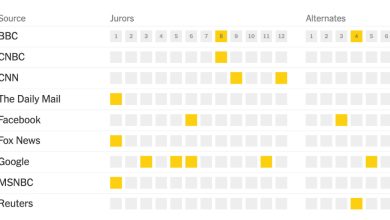How the ‘Whole Life’ Movement Challenges the Politics of Left vs. Right

I was in college, just old enough to vote, when I first bumped into the left-right binary of American politics. I was volunteering with undocumented immigrants, and particularly passionate about the alleviation of poverty, so I was drawn to progressive student groups. But I was also pro-life and involved in more conservative religious groups on campus. My friends and I often felt like we didn’t fit anywhere politically.
Over the decades since then, I’ve often been frustrated and befuddled by what felt to me like the arbitrary bundling of political issues in each party. So people or movements that don’t fit neatly into our political categories often catch my eye.
One of these is the whole life movement, a group that sometimes describes itself as having a “consistent life ethic” or being pro-life “from womb to tomb.” People and organizations in this movement are committed to protecting the life and dignity of all people, particularly those who are vulnerable. This usually involves opposition to abortion, euthanasia, nuclear weapons, and the death penalty. It also often involves championing policies and practices such as a living wage, universal access to health care, ecological and racial justice, and adoption.
Charlie Camosy has been a leader in this movement. He is an associate professor of theology at Fordham University with a focus on moral theology and bioethics, and an author of several books, including “Beyond the Abortion Wars” and “Resisting Throwaway Culture.”
I asked him to speak with me about his most recent book, “Losing Our Dignity: How Secularized Medicine is Undermining Fundamental Human Equality,” and about the whole life movement more generally. This interview has been edited and condensed.
Some people reading this will immediately say, “Well, which party does the whole life movement fit in?” It will be easy for people to say, “Is this just kind of a softer, gentler Republicanism? or “Is this just pro-life progressivism?” How do you think about this politically?
I think most people who pay attention to the political winds and trends agree that we’re in the midst of a political realignment right now. It just isn’t clear what the parties stand for in many ways, especially on the Republican side. What is a Republican right now? That seems to be totally up for grabs. So in some ways, a whole life movement that doesn’t track with our right/left political binary is right where it should be because this binary is a terrible, limiting, toxic thing.
This movement is about something bubbling up from outside of those national political assumptions and power structures.
I think Gov. John Bel Edwards of Louisiana is the perfect example. Here’s a Democratic governor with an unblemished record of supporting prenatal justice. But also, he expanded Medicaid and is pursuing a host of other social justice measures that would be associated with the left. I mean, who is John Bel Edwards? According to our political assumptions, on a national level, he doesn’t fit at all. But to say that he has no political home would only be true on a national level.
If you get down to the local levels where people are, you get to what people actually think. People like John Bel Edwards can become governors of states, right? So the more that we can move away from that toxic political binary that has so dominated our national discussion — if we can resist that — then I think something like a whole life movement becomes not only possible, but very attractive.
A number of ethicists, most prominently Peter Singer — who you count as a friend and have modeled friendly debate with — have made the case for distinguishing between “human beings” and “persons” with inherent rights and dignity. “Persons” would potentially exclude those human beings with profound disabilities as well as infants and others who are not capable of rational self-awareness. You and others in the whole life movement think this is a deficient understanding of personhood. Why is it important to understand this?
The central argument of my book was really to say that we’ve lost the kind of language to speak about personhood, at least in ways that make all of us equal. My book is an attempt to sound the alarm and note this shift is largely happening without our really realizing it. And for us to take stock of this and say, do we want to make this distinction between human beings and persons? Is this the direction we want to take? I hope the answer is no. I hope we can pause and say we need to get back to this idea where we didn’t make distinctions between human beings and persons.
In your book, you talk about your growing concern about how our culture views those with dementia and Alzheimer’s. My mother has Alzheimer’s so this is very personal to me.
I think if we continue down this path, we’ll say that these are human non-persons. They’re living members of the species homo sapiens, and for the most part, their bodies are functioning, but they’ve lost certain capacities that we’ve decided are what matter. And one of the most important ideas about fundamental human equality, whether in a secular sense or a theological sense, is that it shouldn’t matter what your capacities are, that we’re all equal regardless of these — to use a philosophical term — these “accidental truths” that have nothing to do with our essence. Our essence is the same. Our natures are the same. They bear the image and likeness of God in exactly the same way. We’re all the same on the basis of the kinds of creatures we are, and we share that nature in common.
But we have rejected that vision of the good, as a culture, and this group will be the next to fall. If we think about where we choose to put our resources, our medical resources and care resources, many people in this population just die because of neglect.
A New York Times investigation recently found that somewhere between a fifth and a third of residents in nursing homes who have dementia are given antipsychotic drugs not because they have any psychosis, but because they just want to keep them docile. The story referred to it as giving them a chemical straitjacket, and to use these drugs in this off-label manner not only takes them away from any human interaction, but dramatically increases their chances of dying on top of it.
In the next 20 years, the population of those with dementia is going to double. In 30 years, it’s going to triple. So what I’m profoundly concerned about is if we’re already treating people, especially with later-stage dementia, this way with the resources we’ve chosen to put into this now, what is it going to be like when this population doubles or triples?
We really need a total rethink of our elder care system, of our vision of human dignity and of the resources we’re willing to put into this. We’re going to have to massively ramp up our resources for elder care and dementia care if we’re going to meet this moment. And I fear that if we don’t have the changes we’ve been talking about during this interview with regard to human dignity, we will move in the direction of either so-called “robot care,” where we imagine an algorithm can care for somebody, which is ridiculous, or just straight out, no chaser euthanasia. So the stakes couldn’t be higher for us to get this right and move our vision of human dignity in a very different direction.
What about people who are hearing you and saying, “Well, we can’t really know what makes someone a person or when life begins or ends, and your ideas that all humans are persons who are fundamentally equal in human dignity are just your own personal religious convictions, so this is about individual choice.” What would you say to folks who say this is mostly about personal religious convictions and that that cannot affect policy in America?
On one level, it’s obviously not just about religion because a significant chunk of the whole life movement and the pro-life movements are not religious people. I commend to your readers the group Secular Pro-Life as just one of several examples of this.
But on another level, I don’t like the religious/secular binary when it comes to ethics. Everyone — regardless of your claims about the transcendent and God and organized religion — has irreducible first principles, fundamental goods that you don’t have because of arguments. If you just go down and try to reduce all of your values, you’re eventually going to come to something you believe just because you believe it, because of intuition or some other kind of authority. And sometimes it’s at odds with the views of others.
But I don’t think we say to secular people, “Oh, you can’t use your first principles or fundamental values to try to work for justice, say, to impose a view of the good onto others who think differently.” If you care about justice at all, you care about imposing it on others. The whole point of things like the antislavery movement or the civil rights movement was to say, “We have this vision of the good and we’re here to impose it on those who think differently.” That’s what justice requires.
How do you think about finding common ground on some of these issues with people who may not share your point of view?
A “whole life” ethic can and does offer common ground that otherwise wouldn’t exist with the national binary. For instance, we can disagree about abortion law, but we can agree, I hope, that if one is pro-choice, that one wants women to have the resources to choose want they want — including life, if that’s what they want.
On euthanasia, for instance, we can maybe disagree about what the law should be, but we can agree that we should reduce the stigma surrounding disability and those who are not “autonomous,” quote unquote. All the data seems to say that people who choose assisted suicide in the states where it’s legal often do so because they don’t imagine their lives as having value because of their lack of autonomy.
A “whole life” approach would highlight where we agree on all sorts of issues.
However, I just want to emphasize that we need to find ways to actually disagree with each other. I mean, there’s an open question about whether that’s even possible now. Disagreement requires precision. It requires understanding what your particular opponent thinks. It requires getting into the head and heart of someone and to do one’s best to steelman, not strawman their position.
Right now, with the kind of antagonistic political binary we’ve set up, none of that is happening. So one underrated thing that I think a whole life approach really helps us to do is have actual disagreements — real, authentic disagreements, getting to the real nub of the matter instead of dismissing each other across this antagonistic binary.
Have feedback? Send a note to [email protected].
Tish Harrison Warren (@Tish_H_Warren) is a priest in the Anglican Church in North America and author of “Prayer in the Night: For Those Who Work or Watch or Weep.”



